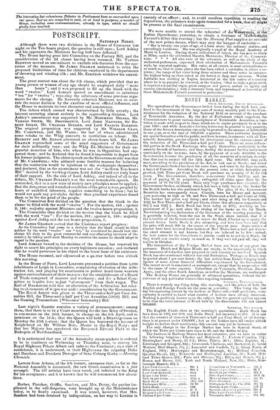POSTSCRIPT.
SATURDAY NIGHT.
Although there were two divisions in the House of Commons last night on the Ten-hours project, the question is still open ; Lord Ashley and his opponents the Ministers having both been defeated ! The House having gone into Committee on the Factory Bill, and the consideration of the 2d clause having been resumed, Mr. TATTON EGERTON moved an amendment to exclude silk-factories from the ope- ration of the measure. Sir JAMES GRAHAM undertook to relax the proposed limitations of time for children employed in the departments of throwing and winding silk ; and Mr. EGERTON withdrew his amend- ment.
The great contest was about the 8th clause, which provided that no young person or woman of any age should be employed daily " more
than hours "; and it was proposed to fill up the blank with the word " twelve." Lord ASHLEY moved an amendment to substitute " ten " for " twelve " ; repeating the substance of some previous argu- ments for the change. He fervently exhorted Ministers not to over- rule the recent decision by the exercise of mere official influence, and the 'House to maintain its own character and consistency.
The debate which ensued was characterized by little novelty ; the interest centering almost entirely in the approaching division. Lord Ashley's amendment was supported by Mr. MONCKTON MINES, Mr. VERNON SMITH, Mr. BROTHERTON, Lord JOHN MANNERS, SIT RO- BERT &GLIB, Mr. CHARLES BULLER, and Lord FRANCIS EGERTON. The original proposition was supported by Sir WILLIAM CLAY, Mr. CannwEil., and Mr. WARD ; the last of whom administered some rebuke to the Whig converts to restriction on labour. Mr. BECKETT and Mr. ALDAN advocated an eleven-hours bill. Sir JAMES GRAHAM reproached some of the usual supporters of Government for Their unfriendly tone ; and the Whig Ex-Ministers for their un- grateful desertion of him, who when he was in Opposition had sup- ported them : and he declared that he found it impossible to depart from his former judgment. The ablest speech on the Government side was that of Mr. CARDWELL ; who adduced some forcible reasons for believing that the restriction would be injurious to the workpeople themselves ; and, declared, that as the amendment was not the "uniform Ten-hours Bill" desired by the working classes, Lord Ashley could not truly boast of their support. On the side of Lord Ashley, and indeed of all in the debate, Mr. CHARLES BULLER'S R as the most remarkable speech. He contended, that to a new state of society new principles must be applied ; that the dangerous and wretched condition of the great towns, peopled by hosts of unskilled labourers, requires something to be done ;. but he would not push any principles further than practical experience found them to be for the good of the people.
The Committee first divided on the question that the blank in the clause be filled with the word " twelve ": For the motion, 183 ; against it, 186; majority against Ministers and the twelve-hours proposition, 3.
The Committee then divided on the motion that the blank be filled with the word " ten " : For the motion, 181 ; against it, 188 ; majority against Lord Ashley and the ten-hours proposition, 7.
Sir JAMES GRAHAM moved that the Chairman report progress : As the Committee had come to a decision that the blank should be tilled neither by the word "twelve " nor " ten," he considered he should best dis- charge his duty to the great commercial and manufacturing interests of the country by taking until next Monday to consider the course he should adopt in regard to the question.
Lord ASHLEY bowed to the decision of the House, but reserved his right to assert his principles on every legitimate occasion ; and declared that he would persevere in his object to the latest hour of his existence.
The House resumed, and adjourned at a quarter before two o'clock this morning.
In the House of Peers, Lord LILFORD presented a petition from 5,000 inhabitants of Leigh in Lancashire, complaining of evasion of the Arbi- tration Act, and praying for enactments to protect hand-loom weavers against encroachments of their masters ; for the establishment of a Board of Trade composed of masters and workmen ; and for a Select Com- mittee to inquire into unjust "abatements" from their wages. The Earl of DeLnousre said that an alteration of the Arbitration Act relat- ing to abatements of wages was under consideration by the Government.
The Roy al Assent was given to the Three-and-a-half per Cent An- nuities Bill, the Three-and-a-half per Cent Annuities (1818) Bill, and the Gaming Transactions (Witnesses' Indemnity) Bill.


























 Previous page
Previous page